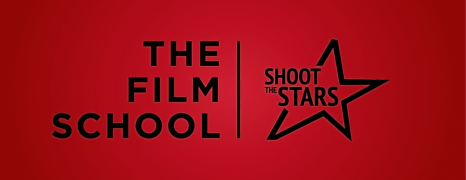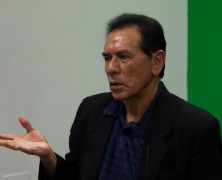Filmmaker Jilann Spitzmiller and Film School instructor Hank Rogerson premiere their film Still Dreaming at The Screen this weekend.
Prepping Oasis and Disposables
posted by Charlotte Martinez
Following selections of Shoot the Stars third season scripts “Oasis Motel” (written by Julie Wittrock) and “The Disposables” (written by Keegan Moore and Dylan Hamilton-Smith), The Film School has recently announced the directors and producers of the ambitious two-day shoot scheduled for November. After interviews with Department Chair Chris Eyre and production mentor Hank Rogerson, Bonnie Burchfield—a senior film major and co-producer of last year’s “Mister Stapleton”—will direct “Oasis Motel,” a contemporary drama with a strong female lead. And Peter Crowder, senior film major, will tackle the “Enter the Dojo” web series spinoff titled “The Disposables.” “It wasn’t a script that was submitted,” Crowder says, explaining the circumstances of “The Disposables” selection. In the past, scripts have been chosen from a pool of student submissions, usually one drama and one comedy. “It was an idea that the school had,” Crowder explains, “a marketing move a bit.” Because College of Santa Fe alum Matt Page has gained wide viewership on his “Enter the Dojo” web series (about the world of an American karate school taught by Matt Page’s character Master Ken), Crowder explains that The Film School was hoping for Page’s “followers” to become aware of Shoot the Stars, while Shoot the Stars would provide an unique opportunity for “Enter the Dojo.” So while the branding of Page’s web series remains consistent, the Shoot the Stars team would have creative rights to an original Dojo offshoot. In preparation for writing a script, Crowder explains that the new Shoot the Stars class watched “Enter the Dojo: 100 Ways to Kick the Groin” in order to “get a feeling” of Page’s style. Consequently, film students Dylan Hamilton-Smith and Keegan Moore (the Dylan and Keegan comedy duo as they’re known in The Film School) wrote a fitting short called “The Disposables.” “If you remember The Expendables,” Crowder says, “about a group of aging action heroes…that could be an [inference] of the title of our project.” Regarding the writers of “The Disposables,” Crowder adds, “they’re absolutely hilarious people.” Despite working closely with Page in branding consistency, Crowder says that the Shoot the Stars team won’t be creating another web series episode, but a “little feature[tte] of what is Master Ken’s life outside of the Dojo.” And though Page’s Master Ken character will be key in the original script, the required Shoot the Stars guest actors (an unidentified 40-year-old woman and 50-year-old man) will also appear in the story. “The script is in motion, it’s fluid and subject to change,” Crowder says. Meanwhile, he prepares for his shoot by analyzing the script and solidifying the “look” of the film. As far as an artistic vision, it helps that Crowder’s range of filmmaking is so diverse. Able to “play with the cheesy and funny action films” to the “bad B movies,” Crowder says he has experience in working with heavy visuals as well as heavy dialogue. And running, for example, SFUAD’s Rock Horror Picture Show on campus for the third year running has made “working with other people” his speciality. “If a script is intentionally bad or even unintentionally bad,” Crowder muses, “there is an opportunity to make it a great movie. It’s so much fun to do that!” Supporting Crowder as co-producers in “The Disposables,” juniors Matthew Krekeler and Anastasia Gendelman have already begun planning for the November shoot. This week, the producers will hold, for example, interviews for positions like director of photography, cinematographer and production designer (a position which Gendelman assisted in last year and says is a “totally different realm” than producing). “Producers should be able to find the right people,” Krekeler says. As previous locations manager for Shoot the Stars, Krekeler knows the importance of “building a team,” a task which Krekeler and Gendelman have found simple due to the “passion” encountered in their “awesome interviews” thus far. With the addition of a Shoot the Stars class, Krekeler and Gendelman say they have started interviews and meetings early this year and have procured, thanks to Film School Assistant Chair Paula Amanda, “Longmire’s” old office space in Onate Hall. They hope to utilize the space for production meetings, storyboarding, scheduling, etc. “It adds to the real world experience,” Krekeler says. Bonnie Burchfield, director of “Oasis Motel,” is also grateful...
Directing Studi
posted by Nicholas Beckman
“It must be a dictatorial role,” actor Wes Studi says of directing, during a Feb. 5 visit to Hank Rogerson’s directing class.
2013 Launch of Shoot the Stars
posted by Charlotte Martinez
Tuesday, Sept 24, Film School Chairman Chris Eyre officially announced this year’s Shoot the Stars scripts, directors and producers. Two teams, two stars, two films! “These were extremely difficult selections,” Eyre writes in his email to film students, some of whom were disappointed not to see their names on the list of directors and producers. “We have so many talented students here at The Film School,” Eyre continues, “Hollywood, of course, is a place where ‘no’ is said a lot more than ‘yes.’” Last year, Eyre initiated the first of the Shoot the Stars projects, announcing that every year in November the Film School would hire two well-established “star” actors to work under two student-assembled film crews. The product would be two short films, produced entirely by the Santa Fe University of Art and Design Film School. For seven students, the announcement of scripts, directors and producers was taken with relief and great anticipation. “I’m dying to be a director,” says Joshua James, the official director for Baxter Smith’s screenplay, Mister Stapleton. When he was called for his interview, James explains, he didn’t know what to expect. “The email said you had to have a pitch ready…but when I got in there, it wasn’t so much a pitch as it was a conversation.” Similarly, Bonnie Burchfield, the Producer for Mister Stapleton, describes the interview with Assistant Chair Paula Amanda and Hank Rogerson, film production instructor, as a conversation between acquaintances.“It was very calm,” Burchfield says. “I didn’t feel like I was going into a tense situation. Hank has such a warm vibe about him anyway, he’s so soothing that it made me feel really confident.” Hank Rogerson, in charge of Shoot the Stars’ production team, explains that in selecting candidates for director and producer “faculty goes by class experience,… applications, GPA, and year. And then,” Rogerson adds, “it comes down to how they present themselves in the interview, through preparation, presentation and vision.” As upper classmen, both James and Burchfield share the benefit of having worked with the Film School staff. In anticipation of Shoot the Stars 2013, they’ve directed and produced their own students films. “What made the final selections stand out,” Rogerson says, “was how much they presented a whole package—from vision for the projects to track record in the department.” For those unfamiliar with the tasks of a film producer, Burchfield considers it the job suited for “real problem solvers.” “They’re there to do the business end,” she says. “The end that the director doesn’t want to think about.” In charge of budget for pre-production, production and post production, Burchfield says, “they stay with it through to the end, into marketing, into the film circuit.” The problem solving, Burchfield describes, comes in when the director’s vision does not match the boundaries of the budget. “They have to provide other options,” Burchfield says, “that stay within the creative vision of the director.” Speaking of directors, Joshua James, a senior of the Film School, says he had been thinking of signing up for Shoot the Stars since January. In anticipation, James directed and produced a student film in the Spring called Nightmares and Daydreams in hopes the addition to his resume would give him a leg up. With plenty of film directing under his belt, James says his theater background, five years acting and directing plays in high school, also came up during his interview. “Mister Stapleton is written a lot like a play,” James says. “Baxter described it as kind of a gloried sketch that can be performed live if it weren’t for particular elements. When Chris [Eyre] told me that I got the position, he told me that my theater experience was a big reason for it. He thought I’d be comfortable with the actors and I’d have a good understanding of how to communicate with them.” Terry Borst, screenwriting instructor for the Film School and...





 Jackalope Magazine is the student magazine of Santa Fe University of Art and Design. Building on the interdisciplinary nature of our education, we aim to showcase the talent of our university and character of our city.
Jackalope Magazine is the student magazine of Santa Fe University of Art and Design. Building on the interdisciplinary nature of our education, we aim to showcase the talent of our university and character of our city.
Recent Comments